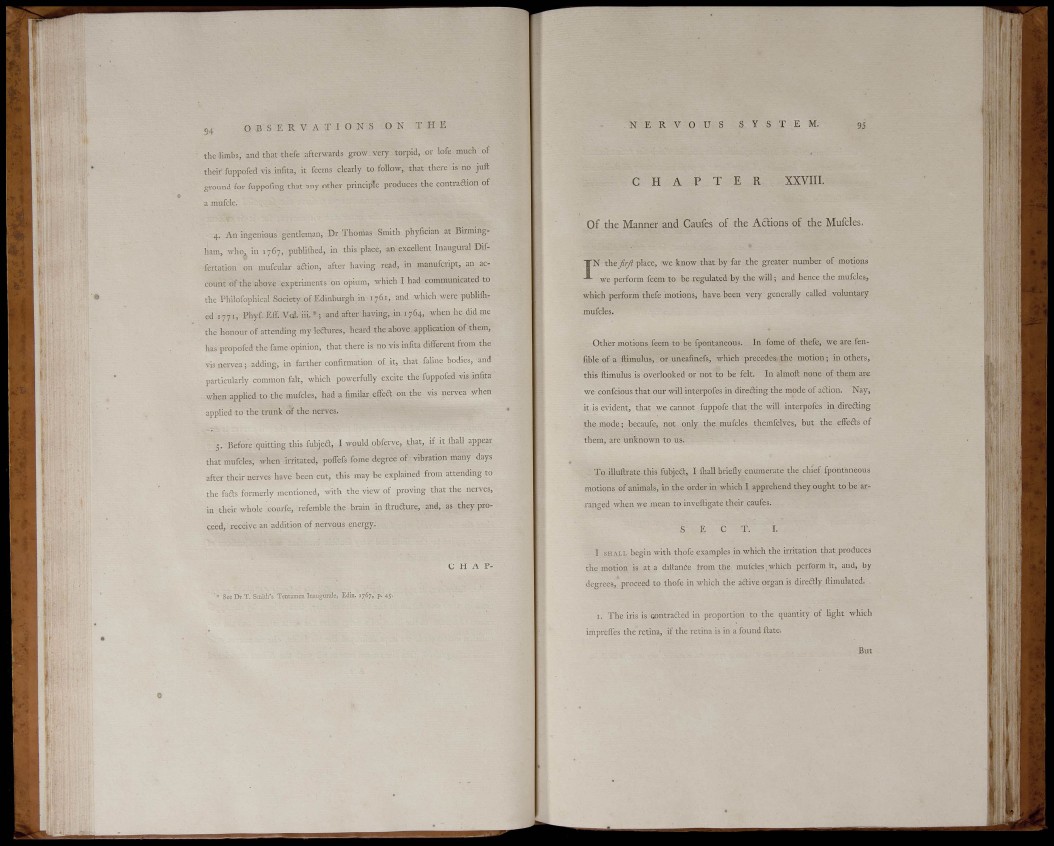
9 4
O B S E R V A T I O N S ON THE
the limbs, and that thefe afterwards grow very torpid, or lofe much of
their fuppofed vis ¡nHta, it feems dearly to follow, that there is no juil
ground for fuppofiug that any other principle produces the contraaion of
a mufcle.
4. An ingenious gentleman, Dr Thomas Smith phyfician at Birmingham,
vv h o , in 1767, publilhed, in this placc, an excellent Inaugural Differtation
on mufcular adion, after having read, in manufcript, an account
of the above experiments on opium, which I had communicated to
the Philofophical Society of Edinburgh in 1761, and which were publilhed
1771, Phyf. ElV. Vol. iii. • ; and after having, in 1764, when he did mc
the honour of attending my leflurcs, heard the above application of them,
has propofcd the fame opinion, that there is no vis infita different from the
visnervea; adding, in farther confirmation of it, that faline bodies, and
particularly common fait, which powerfully excite the fuppofed vis infita
when applied to the mufcles, had a fimilar effeft on the vis nervea when
applied to the trunk of the nerves.
5. Before quitting this fubjed, I would obferve, that, if it ihaU appear
that mufcles, when irritated, poffcfs fome degree of vibration many days
after their nerves have been cut, this may be explained from attending to
the fafts formerly mentioned, with the view of proving that the nerves,
in their whole courfe, refemble the brain in ftruaure, and, as they proceed,
receive an addition of nervous energy.
C H A PSee
Dr T. Smith's Tentamen Inaugurale, Edm. 1767, p. 45.
N E R V O U S S Y S T E M . 95
C H A P T E R XXVIII.
Ì: ' 1
Of the Maaner and Caufes of the Adions of the Mufcles,
IN thcf rjl place, we know that by far the greater number of motions
we perform feem to be regulated by the will; and hence the mufcles,
which perform thefe motions, have been very generally callcd voluntary
mufcles.
Other motions feem to be fpontaneous. In fome of thefe, we are fenfible
of a ftimulus, or uneafmefs, which precedes the motion; in others,
this ftimulus is overlooked or not to be felt. In almoft none of them are
we confcious that our will interpofes in diredbing tlie mode of aclion. Nay,
it is evident, that we cannot fuppofe that the will interpofes in direfting
the mode; becaufe, not only the mufcles themfelves, but the effeils of
them, are unknown to us^
T o illuftrate this fubjea, I iliall briefly enumerate the chief fpontaneous
motions of animals, in the order in which I apprehend they ought to be arranf^
ed when we mean to inveftigate their caufes.
T .
I SHALL begin with thofe examples in which the irritation that produces
the motion is at a diftanCe from the mufcles. which perform it, and, by
degrees, proceed to thofc in which the adive organ is diredtly ftimulated.
it,:, y.I
I. Tlie iris is Gontradcd in proportion to the quantity of light which
imprcfles the retina, if the retina is in a found ftate.
But
ir
i R